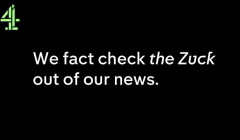
Channel 4’s fact checks the Zuck out of its news
The responsive campaign underlines the role of the news brand as a source of trusted news.

When London Mayor Sadiq Khan shares the stage with Richard E. Grant (fresh off the back of an Oscar nomination), Paul Polman the former CEO of Unilever and countless highly acclaimed marketers, you know you’re in for a few interesting discussions.

When London Mayor Sadiq Khan shares the stage with Richard E. Grant (fresh off the back of an Oscar nomination), Paul Polman the former CEO of Unilever and countless highly acclaimed marketers, you know you’re in for a few interesting discussions. AdWeek Europe 2019 descended on Picturehouse Central for a week that centred around inclusion, mental health in the workplace and the changing nature of leadership.
On a panel hosted by Nicola Kemp, Campaign’s Trends Editor, entitled Who Run the World? Karen Stacey, CEO at Digital Cinema Media emphasised the importance of emotional intelligence when it comes to being a leader: “When a leader engages with you emotionally, you get the best from someone … Companies need to look at leaders differently.” On a similar note, Nigel Redman, Head of Performance Team Development for British Swimming told the leaders in the crowd that “All we can do is get in their way or support them to greatness.”
Mental health and general workplace wellbeing was also on the agenda across several talks, with CALM’s CEO Simon Gunning exploring the notion of the changing man on a panel that included Matt Hiscock, VP for Harry’s. As Hiscock said, “Men were ready to talk; society wasn’t ready to listen.” The conclusion? Perhaps society is finally opening up to these conversations, with platforms like the Book of Man providing a space to “redefine masculinity and interrogate it” as the site’s editor and CEO Martin Robinson put it.
One of the most powerful and emotional conversations that happened during the week was The Business Revolution for Inclusion which took place between Paul Polman, former CEO at Unilever and the incomparable Caroline Casey, Founder of Valuable, an organisation that exists to put disability on companies’ agendas. Casey revealed that while “90% of companies claim they are passionate about diversity and inclusion, 4% include disability.” Polman wants us to change the language, instead looking at people’s “differbilities”, the idea that we all have different abilities we can bring to the table. In an impassioned conclusion, Casey pointed out that “when business doesn’t represent you, why would you try? The feeling of being unwelcomed affects everyone. We are more than the label society gives us.”
Here are a few more highlights from the week.

This was the opening remark from London Mayor Sadiq Khan who was interviewed in front of a packed auditorium by the Huffington Post’s editor-in-chief Lydia Polgreen. In a conversation that covered everything from hope to Zadie Smith, American politics and of course Brexit, Khan affirmed that when it comes to his role, he wants to work in tandem with the creative industries: “It’s important to take the power you have and use it in a responsible manner.”
Xav Rees, CEO of Havas London talked similarly about the responsibility that comes with power when onstage with the CEO of Ella’s Kitchen Mark Cuddigan. Rees spoke about Havas London’s recent B Corp certification and how it is “a mechanism that points the agency in the right direction.” Cuddingan, the head of another B Corp certified company and the inspiration behind Havas London’s decision, said, “You have a responsibility to affect change in other companies.” Your employees are vital to the health and success of your business; don’t neglect them. “People first, better results [second],” as Nancy Lengthorn, Head of Future Talent, Diversity and Inclusion at MediaCom said on a panel exploring the importance of mental health in the workplace.

Many a discussion has been had about the importance of diverse inclusion. But what seems to be at the heart of the conversation at AdWeek was that it is only by raising awareness, allowing people to empathise with a world experience that isn’t theirs, that real change can happen. The timeTo steering committee took to the stage to speak about the journey they’ve undergone over the last year. They emphasised that their movement needed cross industry support and to be based on proper data. But, as Lorraine Jennings, Director of Services at NABS revealed, there is a “huge awareness initiative to undertake.”
Microsoft chaired a panel entitled The World is Diverse, so why isn’t your Advertising? where Joshua Graff, Senior Director at LinkedIn Marketing Solutions (EMEA) said, “There are always dinosaurs but change is coming … [there is a] huge education that needs to happen.” And sometimes, that awareness can only drive change if it’s a little controversial: “If you’re going to show diversity, be bold,” as Rich Miles, Creative Director at Therapy put it.

The trend for personalisation has only been on the rise in recent years. But a few panels set out to explore how emotional storytelling and real, true consumer insight can lead to better brand recall and, eventually, product purchase. On one, The Digital Ecosystem of Retail, Struan Wood, Customer Experience Lead at Wunderman, observed, “If you end up being everything to everybody, you’re nothing to nobody.”
The important thing is to appeal to people’s emotions, to tug on their heart strings as much as their purse strings. “Brands aren’t people but you have a relationship with them as you would a person.” So said Joe Devlin, Professor of Cognitive Neuroscience at UCL, emphasising that the relationship with a brand must contain emotion because only then will a consumer truly align with them.
Looks like you need to create a Creativebrief account to perform this action.
Create account Sign inLooks like you need to create a Creativebrief account to perform this action.
Create account Sign in